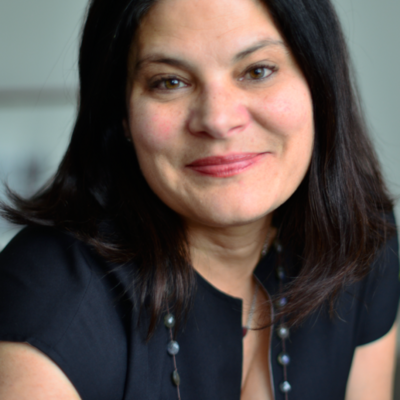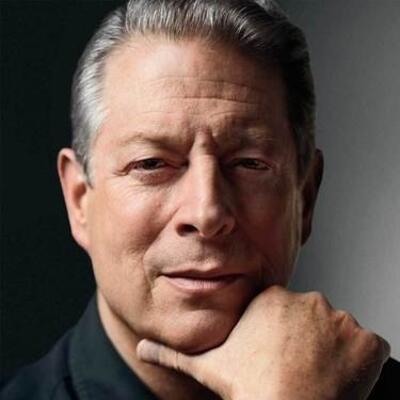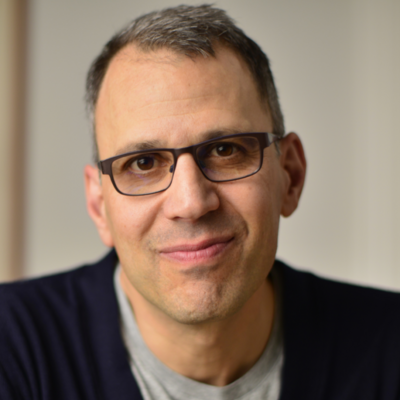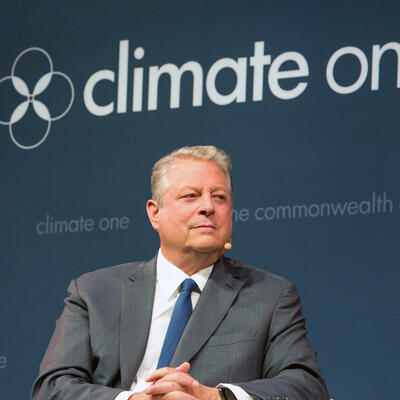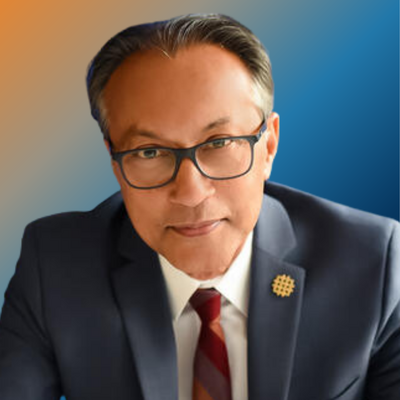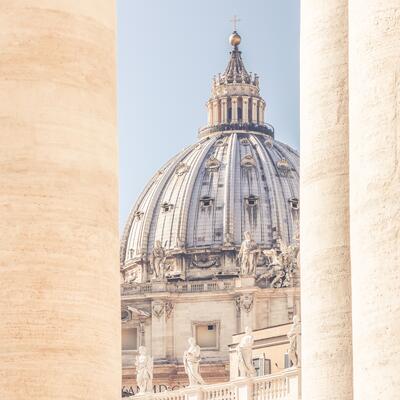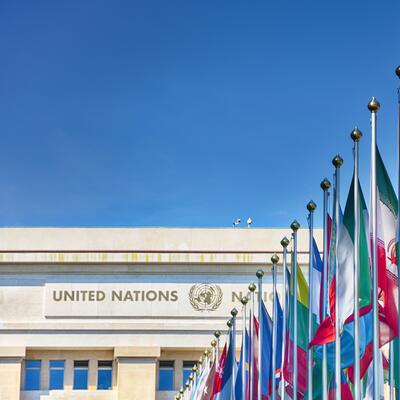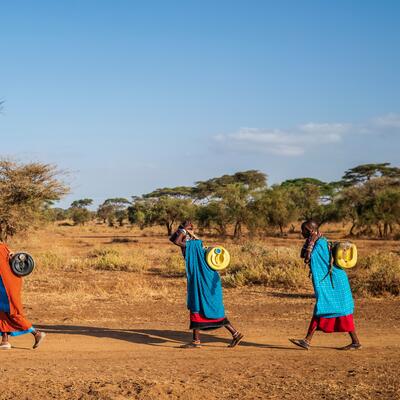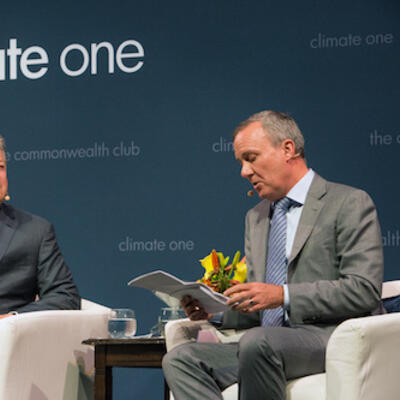
Al Gore and An Inconvenient Sequel: Truth to Power
Guests
Summary
Former Vice President Al Gore joins Climate One to talk about his tireless fight, training an army of climate champions and influencing international climate policy. Joined by co-directors Bonni Cohen and Jon Shenk, this conversation covers the making of their new movie AN INCONVENIENT SEQUEL: TRUTH TO POWER and the solutions that it offers.
This program was recorded in front of a live audience at the Marines' Memorial Club on July 24, 2017.
Full Transcript
Announcer: This is Climate One, changing the conversation about energy, economy and the environment.
In his 2006 film “An Inconvenient Truth,” former vice president Al Gore warned that society was ignoring global warming at our peril. His new film, “An Inconvenient Sequel,” offers a more hopeful note. Part of the reason, he says, is that as with other social movements of the past, the tide of public opinion is turning.
Al Gore: You want to see ferocious resistance to social and moral change. The climate denial is no more ferocious than the resistance to civil rights in the South. And yet, it gave way.
Announcer: More good news? Technology is catching up with the problem.
Al Gore: The cost of renewable energy, batteries, electric vehicles, all part of the broader sustainability revolution are coming down in cost so dramatically that the world has the solutions now.
Announcer: An Inconvenient Sequel: Truth to Power, with Al Gore. Up next on Climate One.
Announcer: How far would you go to spread the word about climate change?
Welcome to Climate One – changing the conversation about America’s energy, economy and environment. Climate One conversations – with oil companies and environmentalists, Republicans and Democrats – are recorded before a live audience and hosted by Greg Dalton.
In 2006, Al Gore brought his climate change slide show to the American public in the Academy Award winning documentary “An Inconvenient Truth.” Back then, Gore warned of an increasing “planetary emergency” if global warming continued unchecked, including rising sea levels, coastal flooding, and nations of climate refugees.
In this year’s follow-up, “An Inconvenient Sequel: Truth to Power,” Gore continues his tireless fight to spread awareness of the problem – and shines a light on some possible solutions.
Today on Climate One, Al Gore joins host Greg Dalton to discuss the making of the film and the path forward. Joining them are the film’s directors, Bonni Cohen and Jon Shenk, who shadowed Gore from his Nashville home to the typhoon-devastated island of Tacloban in the Philippines to the Paris climate summit.
Speaking truth to power, with Al Gore, on Climate One. Here’s Greg Dalton.
[Applause]
Greg Dalton: Vice President Gore, I watched An Inconvenient Truth and then I watched An Inconvenient Sequel. And it seems to me that in the first movie you were speaking from your intellect, lots of facts. And in this one you’re speaking much more passionately from your heart. Is that true?
Al Gore: Well first of all Greg, thank you for doing this. And listening to your introduction moves me to say thank you for holding this in your heart and for being so committed to it.
And if you notice a difference in my approach in this movie compared to the first one, I don't know. There’s an old song written in Nashville by Kris Kristofferson, sung famously by Janis Joplin with the line, “Freedom's just another word for nothing left to lose.” So maybe that applies but it’s also down to the incredible skill that Bonni and Jon have with the cinéma vérité style, you know if they asked to follow you around with cameras for two years of your life, talk to me first. It actually it was a wonderful experience, but when I saw their first rough cut, I was really and truly astonished. There are a lot of things that were on film where I had actually forgotten that they were around because they were always around. And so I give the credit to them for how great the movie is. I’m biased, but I think their talent is just really awesome.
Greg Dalton: Really is in some ways. Rarely are sequels better than the first one. I think this is one of those examples. Bonni Cohen, so how did you get him to open up? How did you convince him you could follow the vice president around for two years?
Bonni Cohen: Well, I can’t give away those secrets, I’d have to, you know, I don’t know what I’d have to do to you.
[Laughter]
You know, when we first went to meet Al in Nashville at his home in Nashville, he was incredibly gracious Southern gentleman that he is. Then proceeded to show us the ten-hour version of his slideshow which is if you know the slideshow, it has kind of an accordion effect that can expand and contract and expand further. And if you give Al the opportunity which we did because we needed to know everything, we got the full whack. So it was quite an experience, it was a life experience that we will never forget. And what we noted at the time of hearing the slideshow was that there's all this work that Al is doing every minute of every day that goes into the building of the slideshow. And we started to think together about what those moments were, the talking to the scientists, meeting with climate refugees, talking to politicians, you know, scouring for information with every minute of every day that he takes breath. So we talked together about how exciting it could potentially be and dramatic to get behind the scenes for that work to see firsthand what that work looked like.
He – I think Al, correct me if I'm wrong – I think Al understood very early on that those kinds of – the authenticity of those scenes would be undeniable. And that, you know, given where we are in the world where we unfortunately still are having to convince some people about the climate crisis and now go the next step to convince them about the sustainability revolution, that the authenticity of cinéma vérité was the way to go. So we kind of first spoke with him on an intellectual level and then, you know, Jon shot this beautiful movie in its entirety and is responsible for being that fly on the wall with Al in the scenes. So, you know, he should certainly comment on this, but when things started to happen in a room he’s so engaged with whatever is going on that he did in fact forget what was happening and we were able to really capture authentic moments, emotional moments.
Greg Dalton: And one where that really comes through, Jon Shenk, is in Paris where it's two weeks before the climate summit, Vice President Gore is doing this 24-hour kind of video and then something happens. Set the scene for us in Paris.
Jon Shenk: Yeah, couple of weeks before the Paris climate conference that was to take place in December 2015. Al went to Paris in late November with The Climate Reality Project with the idea that he was gonna do a 24-hour broadcast around the world to raise awareness specifically for how important Paris was in the environmental history. And we were kinda gearing up to film for 24-hour straight. Al was gearing up to stay up 24 hours and do broadcast.
Anyways, we were there and that day happened to be the fateful day of the terrorist attacks that occurred in late November 2015. We were under the Eiffel Tower in the middle of the city and we started hearing sirens and ambulances and police cars going by of course wondering what the heck was going on, everybody had their cell phones out. And you see in the film this drama unfold essentially you as the viewer find out as we found out that night what occurred.
And the interesting thing that happens is that, you know, people get very scared of course. We really viewed it as kind of a key moment in the plot of the film because Al rightly so identified this as an important moment where the media doesn't always connect the dots between current events that happen in the world. And of course, you know, Al steps up and gave a great and incredibly emotional speech that night, helping to comfort the French crew and telling the French that the Americans stood with them in that time of difficulty. But then kind of goes on to talk about the human condition and how it's in difficult times that people bind together. And it set a very kind of somber and serious but proactive tone going into the Paris climate negotiations which happened two weeks later in Paris.
Greg Dalton: Then, Vice President Gore, there was a change to the film. There's some changes when President Trump took office.
Al Gore: Almost choked on that.
[Laughter]
Greg Dalton: It’s a little hard to.
Al Gore: Go ahead. Sorry.
[Laughter]
Greg Dalton: So tell us how that changed your thinking and how it changed the film and changed a lot more.
Al Gore: Well, Bonni and Jon and I had talked numerous times during 2016 about the fact that we really did not know for sure how the election was going to come out. And whoever was elected what that person would do on climate; of course there was a stark choice. But third we didn't really know how those events would feel after they settled in. So they wisely made the decision to wait in order to finish the film until we really knew what was going to happen, what had happened and how it was going to feel. And actually we knew that even after the festival premiere at Sundance that there would have to be changes to the movie to incorporate the new elements of the narrative as they were unfolding.
Greg Dalton: And a lot of that is really pulling out from the Paris climate accord. You issued a statement on that, that’s part of the movie. How do you think the pullout from the Paris climate accord is gonna affect that accord?
Al Gore: Yeah, I was really worried when Donald Trump made his statement. I had tried hard to convince him in personal conversations starting in Trump Tower during the transition, continuing in the White House, to stay in the Paris agreement. I thought I really do think there was a chance he would come to his senses, but I was wrong about that.
But when he did make his speech I was deeply concerned that other countries might have used it as an excuse to pull out of the Paris agreement themselves. But I was immensely gratified when almost immediately afterward the entire rest of the world redoubled their commitment to the Paris agreement almost –
[Applause]
– as if they were saying, well, we’ll show you Donald Trump. And then here in this country so many governors and mayors and business leaders incidentally led by Jerry Brown here in California.
[Applause]
And quite a number of states are moving in that direction and all of these groups, including a lot of California companies and Apple and Google and others come to mind who are already hundred percent renewable here. And then Apple in China as well have stepped up to say we’re still in Paris; we’re gonna meet the U.S. commitments regardless of what President Trump does or says or tweets. And now the best estimates give rise to legitimate hope that the U.S. is likely to meet the commitments made by former President Obama in the Paris agreement regardless of Donald Trump.
Now the Paris agreement even if all of its commitments by all 194 nations are kept, is still not enough; we need to do more. But as and Bonni and Jon document in the film, how the cost of renewable energy, batteries, electric vehicles, efficiency improvements, all part of the broader sustainability revolution are coming down in cost so dramatically that the world has the solutions now. And so we have seen since the Paris agreement amazing new commitments. India's just announced that within 13 years all of their cars and trucks are gonna have to be electric vehicles, the new ones, which is an amazing –
[Applause]
– and they, India and China are closing hundreds of coal-fired plants, vastly expanding solar and wind.
So I was really heartened that the momentum generated around the world, not least by the Paris agreement not least by the technology revolution it is now going to continue moving forward. And others are coming to the rescue – one other point, the first day that the U.S. can actually legally leave the Paris agreement – not entirely by coincidence – is the day after the 2020 presidential election. And if there's a new president –
[Laughter]
[Applause]
– a new president can simply give 30 days’ notice and rejoin the Paris agreement. So we’re gonna win this. The remaining question is whether we’ll win it in time. Regrettably, a lot of damage has been done. We still have the opportunity to avoid the catastrophic results for human civilization. But we have to build on this momentum and increase it.
Greg Dalton: Bonni Cohen, one of the critiques of An Inconvenient Truth, it was long on problems, short on solutions. And when people think people wrestle within communications is balancing that hope and fear. Because you have to tell people how bad it is but not put them into despair that they just sort of paralyze. So how did you approach that in the film to tell people get that severity, but not bum everyone out so they don’t see.
Bonni Cohen: Yeah, you know, it’s a great question. We thought a lot about this and, you know, Al refers to something called the hope bucket that you have to leave people with enough hope that they're willing to act, that they're not paralyzed by the despair of the problem.
And actually when – so Participant Media which produced the first film, when they got together with Al to talk about the sequel, that is exactly the nut of what came up, you know, we have to report on how far the climate crisis has gone, climate related extreme weather is a lot worse. We have to talk about what the predictions were in An Inconvenient Truth and where we are now. But the great news is that there is a sustainability revolution underway now; the solutions are in place. The cost down occurs for solar and wind are extreme and it’s time to act because there are so many things to do. So we had the great fortune in this film of being able to have the hope built in and actually leave viewers hopefully with something really tangible to do.
Greg Dalton: Jon Shenk, Vice President Gore just mentioned California's recent extension of its climate law. One of the critiques of the climate, the sustainability revolution is that it’s not including everyone. That some people, certainly some countries, some Americans are being left behind and not included in this the environmental justice movement in California was actually opposed to the extension. So how did you come at that issue of inclusion and everyone being part of the sustainability process?
Jon Shenk: Well, I think that what’s just dawning on the public is just how fast this is happening. Al, we’re stealing all of his lines and it's embarrassing to do it right in front of him.
[Laughter]
But, you know, the sustainability revolution is it's as big, potentially, as the Industrial Revolution. We’re talking about changing the way that our planet gets its power, you know, you can imagine how much energy that is. And yet technology wise, it’s much closer in metaphor to the computer revolution and that's the speed at which it's happening. So you think about Moore's law and how fast computer chips shrunk and grew in power. That's what's happening with solar and wind and other sustainable technologies.
And so that's and that’s precisely the debate that’s been going on that you refer to between the developing world and the developed world been kind of the nexus of tension in the U.N. for decades now at the international level. But the reason that India has chosen to go electric in their vehicles and the reason that they’ve canceled I think all of their coal plants now or most of the coal plants moving toward solar and wind, is that they realized that this, the technology actually potentially helps the developing world and the poor people of the world even more than the developed world, because they can leapfrog all of our, you know, our current technology and energy plants that we've built and the infrastructure that we already have and go right to those technologies which will help bring people out of poverty.
Al Gore: If I could add to that response, very well said. They present in the movie the statement by Pope Francis about how the environmental justice concern is interwoven with the climate crisis and the impacts are always harshest on poor people everywhere in the world. And in addition there's something really incredible about this sustainability revolution and it's presented in the film.
There's an analogy between what happened with cell phones and what's happening with solar and wind. When the cell phone, mobile phone revolution started there was a business, a consulting firm that advised AT&T at their request, they asked back when the first clunky models came out, how many can we sell 20 years from now in 2000. And they studied and came back and said good news, 900,000. And when the year 2000 arrived, they did sell 900,000 in the first three days of the year. And then when you disaggregate the rich and poor countries, it’s really evident that the increase was significant in the sales of cell phones in the developed world. But in the developing world, they just skyrocketed. Why? Because in most of the world the landline telephone grids were not particularly well developed and in many areas didn't exist at all. So they had the opportunity to leapfrog the old technology on which we built our communications system and go straight to the more advanced technologies.
Well if you look at the electric line grids in the developing countries, it’s exactly the same thing. They’re almost as many people in India with no electricity at all, as the entire population of the United States. And the idea of building more coal plants with all the air pollution as well as climate destruction and the copper wire and the poles and everything, instead they're just leapfrogging that to solar and wind. There was an article in the Wall Street Journal this morning about of all things medical technologies, how the same phenomena is happening there with the developing countries taking the lead. So yes, the impact is harsher on low income communities, and communities of color, but the opportunities are being seized more enthusiastically to leapfrog the old technologies and go straight to the 21st century opportunities.
Greg Dalton: If you’re just joining us on the radio, our guests today at Climate One at the Commonwealth Club is Vice President Al Gore, has a new book and film out called, An Inconvenient Sequel: Truth to Power. We’re also joined by the directors, Bonni Cohen and Jon Shenk.
Some people who are not often part of this climate conversation are people on the right, people in Tea Party and there's a cofounder of the Tea Party movement named Debbie Dooley, who you know. And she loathes Hillary Clinton, she loves Donald Trump, she doesn't think Russia collusion is a big deal. Let's hear what she has to say, some surprising things she has to say about clean energy and fossil fuels.
[Start Clip]
Debbie Dooley: 75% of Trump supporters like renewables and they think we should do more to advance renewables. We need to look forward to innovation to technology to clean energy and job creation. Koch brothers funded groups, they're horrible. I don't like it. I'm not fond of Koch brothers or their groups in any way because I've had experience with them actually lying outright lying and distorting the facts. And some of the very same people that are these groups like Heartland and Competitive Enterprise Institute that are saying man is not damaging the environment and renewables are bad, in the 1990s the same groups were taking money from big tobacco to convince America secondhand smoke pose no health risk. If they lied to us once, why should we believe anything they say?
[End Clip]
Al Gore: Alright!
[Applause]
Alright, Debbie!
Greg Dalton: That’s Debbie Dooley, cofounder of the Tea Party movement. Vice President Gore, your response to reaching people not – that’s an unusual Tea Party person but reaching people who disagree with Democrats on a lot of things but she agrees on clean energy.
Al Gore: Yeah, one of the things that's happening is people who aren’t comfortable using the phrase global warming or climate crisis are first of all noticing the fact that the weather is very weird now.
We've had eleven once in a thousand year events in the U.S. in the last seven years and community by community the floods and the droughts and sea level rise in coastal communities and Zika and so forth are really waking people up even if they don't want to get into a scientific dialogue about climate.
And secondly, they, as Debbie Dooley just said they are seeing the opportunities to save money and free themselves from the abuses they've sometimes felt at the hands of utility monopolies. And as the cause continues to come down further, they want to save money; they want energy independence and energy freedom. And Bonni and Jon had the terrific idea when we were filming the movie of going to Georgetown, Texas. And there's a scene in the movie where Mayor Dale Ross of Georgetown, Texas, he describes it as the reddest city and the reddest county in Texas which is pretty red. And he's a conservative Republican Trump supporter but he's also a CPA. And he did the numbers for how he could save his citizens’ money there in the heart of oil country. They have just completed the transition to 100% renewable energy and they’re saving money. And as they save the money, all of a sudden he feels liberated to say and, you know, the air is cleaner and isn't it better not to threaten the future of the world for the next generation? So coming at it through the economic pathway, is really happening in this country and all around the world.
Announcer: Our guest today on Climate One is former vice president Al Gore. You can listen to all of our programs and subscribe to our podcast at our website: climate-one-dot-org. We’ll continue the conversation right after this break.
[BREAK]
Announcer: Today on Climate One, we’re discussing “An Inconvenient Sequel,” the follow-up to Al Gore’s 2006 documentary on global warming. Our guests are Al Gore and filmmakers Bonni Cohen and Jon Shenk. Here’s Greg Dalton.
Greg Dalton: We’re gonna go to our lightning round here at Climate One at the Commonwealth Club. This is a quick round of questions with quick answers for our guests today, former Vice President Al Gore, Jon Shenk and Bonni Cohen. First for Jon Shenk. True or false. An Inconvenient Truth was an inconvenient title?
[Laughter]
Jon Shenk: I have to say false. An Inconvenient Truth was an instant meme that changed the way we think about global warming in the climate crisis.
Greg Dalton: Bonni Cohen, the number of times you flew on a private jet while making this film on global warming?
Bonni Cohen: Zero.
Greg Dalton: Did you buy offsets for the carbon emissions?
Bonni Cohen: Yes. The whole production has a carbon offset.
Jon Shenk: Actually double offsets, double up.
Bonni Cohen: They also offset.
[Applause]
Greg Dalton: Vice President Gore. Do you agree or disagree. Facts often don't change people's minds.
Al Gore: Yeah, that's certainly true. Anybody that deals with the climate crisis and has had to wrestle with climate denial, if you're really serious about it, you end up delving as I did into neuroscience and behavioral psychology. I've had days, long sessions with both of those groups. First things I learned is you have to keep those two groups apart by the way.
But it’s certainly true and in almost every field, in economics for example or investing. Behavioral investing is now a really important field as we are all learning more about how sometimes our emotions and instincts will cause us to leap to a particular conclusion and then use our rational minds to build a sand castle of logic to justify the conclusion that we reached for other reasons anyway. And one of the frustrating things about climate denial is that the findings for some climate deniers, the more facts that you present, the more they get up their dukes and fight against those facts.
I will say this though. I grew up a big part of my life in the South when the civil rights movement was gaining a lot of momentum. You want to see ferocious resistance to social and moral change. The climate denial is no more ferocious than the resistance to civil rights in the South and yet, it gave way.
And the movie places the climate movement in the context of the civil rights movement long before the abolition movement, the women's suffrage movement, the anti-apartheid movement and more recently the gay rights movement. If somebody had told me 50 – even five years ago that in the year 2017 gay marriage would be legal in all 50 U.S. states and be accepted, honored, and even celebrated by two thirds of the American people, I would've said I sure hope so but what are you smoking because it wouldn’t have sounded realistic. But all of these movements have ultimately resulted in the underbrush being cleared away the strawmen pushed aside to reveal a stark binary choice between right and wrong. And the climate movement and once that happens, then the outcome is foreordained because we’re engaged at the level of conscience and commitment. And the climate movement is right at that inflection point right now.
Greg Dalton: Going from impossible to another level I think you say, back to our lightning round. Jon Shenk your –
Al Gore: Sorry about that.
Greg Dalton: Jon Shenk, your favorite Star Wars character.
Jon Shenk: Oh my gosh.
Al Gore: Don't say Jar Jar Binks.
Jon Shenk: Well, I still keep in my office a picture of me helping the special-effects crew putting R2's head on. And there's a little piece of me that gets emotional, thinking about R2-D2.
Greg Dalton: Vice President Gore, your all-time favorite Grateful Dead show.
Al Gore: Well, actually this is special pleading but I, my favorite was when they did a fundraiser for me in the 2000 race.
[Laughter]
Greg Dalton: So all the songs at that event. Okay.
Al Gore: Uncle John’s Band is my favorite song by the way.
Greg Dalton: Okay. This is word association, I’ll mention a noun and get your response – initially respond whatever you think. First comes to mind, no filter. Vice President Gore, what comes to your mind when you hear collusion?
[Laughter]
Al Gore: Well.
[Laughter]
When you say no filter, you know, I spent a lifetime in politics. I mean it’s hard for me to remove the filter.
Greg Dalton: But that’s over now.
Al Gore: First, do no harm. I don’t want to say what really comes to mind.
[Laughter]
Greg Dalton: Okay.
Al Gore: But you can probably guess.
[Laughter]
More seriously, I think the next few months are going to be a real challenge for our country and we best gird ourselves for it. And I'm heartened by the slowly increasing number of Republicans who have said things that lead me to believe that they are going to be prepared. If, for example, somebody was, well I won’t get into it. But I think there is now a chance that they will step up to the plate if history and destiny call them out.
Greg Dalton: Jon Shenk, EPA administrator Scott Pruitt.
Jon Shenk: Gosh. Oh gosh.
[Laughter]
Greg Dalton: Speechless.
Jon Shenk: What is it? The fox guarding the hen house. I mean, yeah, this is one of the things that we waited for after the film premiered at Sundance. Would Donald Trump make good on his promises to a point essentially fossil fuel executives and lobbyists and to cabinet posts. And I think, I believe Pruitt was one of the first ones named.
Greg Dalton: Last lightning round question for Vice President Gore. This is multiple-choice, A or B. Are more Republicans in Congress in the gay closet or the climate closet?
[Laughter]
Bonni Cohen: Good luck with that.
[Applause]
Al Gore: Well, first of all I have to say somebody should have warned us about this...
[Laughter]
You know, I had no idea what this was going to be like. For God sake, gee whiz. I would say the climate closet; there are a lot of Republicans who really know what the truth is. It is still inconvenient for many of them in their politics, but we interviewed or Jon and Bonni interviewed it didn't make it into the film but and shouldn't have. But they interviewed a guy named Jerry Taylor who ran the Cato Institute climate denial group. He put that out for 20 years and he talked with us and said that he just couldn't do it anymore. He changed his mind. And he told the three of us that there are lots and lots of conservative Republicans that he has dealt with over the years who have asked how do we find a pathway to get off this climate denialism and advocate for the truth. You know, they're scared to death a lot of them, that the Koch brothers that Debbie was talking about will come in and find and others will finance a primary opponent for them if they depart from the orthodoxy. But they do know what the reality is. And I think the dam may break soon, we’re not that far from having a working majority in the Congress. The Senate just defeated Trump’s methane, repeal of the methane rule.
A number of Republicans have joined the so called Noah's Ark caucus in the House of Representatives. And the name comes not only from the story of the deluge but from the fact that they have to join two by two, one Democrat, one Republican. And so we’re slowly getting there.
Greg Dalton: But some people say and there's actually a gap between public opinion even Republicans and the elected officials. And you talked about our democracy being hacked before and it’s really campaign funding. So as long as the funding still stays the same, those Republicans you've talked about are gonna be afraid about the massive money that will come in against them if they take that principle blow.
Al Gore: Yeah that's true. I was thinking when Jon was answering your question about Scott Pruitt of the famous quote from Upton Sinclair more than 110 years ago when he said it's difficult to get a man to understand something if his paycheck depends upon him not understanding it. And read campaign contributions, lobbying gifts for paycheck and there you have a big part of the problem. And yes, when members of the House and Senate feel like they have to spend 4 to 5 hours every single day on average, begging special interests and rich people for money. That is the principle way our system has been hacked. But that really was driven by the dominance of television over newsprint. And now that the Internet is displacing or it’s beginning to displace broadcast cable satellite. Yes, it has all kinds of problems and people in Silicon Valley are struggling to address those problems.
But look at the Bernie Sanders campaign last year. Whether you agreed with his agenda or not, for me, one of the historic accomplishments of his campaign was he proved that it is now possible for a serious presidential campaign to be mounted without any special interest contributions or large donations but entirely based on small donations collected over the Internet.
I think that as we move further into the Internet and social media era we do have a chance of resurrecting the vitality of our democracy lifting the role of reason and discourse and logic and best available evidence. And I really think that a lot of work needs to be done to transition the institutions and forms of our democracy into the digital world in order to once again bring the dream of our founders back to life.
[Applause]
Announcer: That’s former vice president Al Gore. We’ll be back with Greg Dalton and his guests right after this. This is Climate One.
[BREAK]
Announcer: This is Climate One, changing the conversation about America’s energy, economy and environment. You can listen to all of our programs and subscribe to our podcast at our website: climate-one-dot-org.
Today, we’re talking with climate activist Al Gore about his new film, “An Inconvenient Sequel: Truth to Power.” Let’s continue our discussion with Gore and filmmakers Bonni Cohen and Jon Shenk. Here’s Greg Dalton.
Greg Dalton: Bonni Cohen, tell us about some of the scenes that didn't make it into the film that you wish you could've fit in but it didn't fit.
Bonni Cohen: We spent a lot of time on the Gore family farm in Carthage, Tennessee, which is an unbelievably beautiful part of the world. But there's some very interesting work that Al is doing there converting his parent’s tobacco farm into a sustainable organic working farm. I mean it’s under way, it's working. They’re putting vegetables out to communities already.
Al Gore: Supported agriculture.
Bonni Cohen: And supported agriculture, right. We spent a lot of time there and actually feel a tremendous loss not having been able to put more of that work into the film I would say.
Also there is, you know, there is, you visit, Al visits climate refugees in Tacloban in the Philippines which it was hit by superstorm Haiyan it was one of the worst storms to ever hit landfall and the destruction was unbelievable. And, you know, we went around and Al met a lot of, there’s a scene in the film where he meets with some climate refugees, but he actually goes out into the villages and meets with a mother whose home was filled up to the top with water, which had never happened in the 40 years that she had, her family had lived in this house. And it's a very kind of beautiful scene and, you know, you have to leave a lot of these kinds of things on the editing room floor unfortunately, but we had we probably shot 150 hours of footage over the course of the making of the film.
Greg Dalton: That's a lot. We have a question from Facebook. Samuel John asks for Vice President Gore. Do you see the climate problem as more of an issue of excess consumption or not enough green tech? Does the film touch on global consumption?
Al Gore: Yes. And it's commonplace these days to get a question about the linkage between the growth of consumption and the climate crisis. And that is certainly legitimate issue and a lot of people are addressing it in their own lives. The climate crisis in my way of thinking about it is the most serious manifestation of an underlying collision between the way our global civilization is presently organized and the surprisingly fragile nature of the ecological system. You could point to so many other examples, 50 billion tons of plastic since the 1950s, all of it still around a lot of it in the oceans. The destruction of the forest, the sixth great extinction which the biologists will tell you almost to a person that's the most serious manifestation of this.
So yes, we cannot have unlimited growth of consumption in a finite world. But technology can contribute to the solution of that aspect of the crisis as well. We now have the emergence of an increasingly weightless economy and of course it's in many ways centered in the space between the city and San Jose, Silicon Valley with more and more so-called growth in the digital world and with the reduction in material use in the products. And you have great companies like Patagonia promoting the recycling of goods and discouraging the consumption of new goods. And we have a long way to go on that for sure, but that's definitely a part of the crisis.
Greg Dalton: And one part underneath that is population. A lot of the environmentalists don't like to talk about it. You talked about it way back but that's driving a lot of the consumption, 9 billion people.
Al Gore: Yeah, absolutely. And it's on the way to probably more than 11 billion before it stabilizes, potentially more. But here is the good news. The effort to stabilize population growth in the world is actually a success story unfolding in slow-motion. And a lot of progress has been made. I led the U.S. delegation to a conference in Cairo in 1994 where this consensus was really solidified. I don’t wanna get too geeky, I’ll do this quickly, but it goes from one equilibrium population growth goes from one equilibrium down an S-curve to another.
The first has high birth rates and high death rates and large families. And the second equilibrium is low birthrate, low death rates, small families. Most of the wealthy countries have already made that transition. There are people in this audience probably the majority if you go back two generations where there were six kids in the family give or take and now two is the average, even less. And that's true not only in all the rich countries, but all other countries in the world are on their way down that S-curve. Population is stabilizing in China, stabilizing in India. There are parts of South Asia and especially in Africa a lot of countries still have very high birth rates.
Now what causes this transition, four things and all these factors have to be present. The education of girls and the –
[Applause]
– boys too but girls have not had the same opportunities. The empowerment of women to help to participate in the choices in the family, the community, the nation. The availability of fertility management on the ubiquitous or nearly ubiquitous basis so that women and their partners can choose how many children to have and the spacing of those children. And most importantly continued declines in child mortality. A famous African leader said 70, 80 years ago the most powerful contraceptive in the world is the confidence by parents that their children will survive. When all four of those conditions are present, it’s almost magical that the growth rate comes down quite quickly. The death rates come down first and a generation later the birth rates come down.
But now the U.S. has reneged on its promises to assist the world in making fertility management, more available, and there's a whole history on that that we won't go into. But if we can make sure all four of those conditions are present, we are going to stabilize population growth.
Greg Dalton: If you’re just joining us today at Climate One at the Commonwealth Club. Our guests are Al Gore, who has a new film out, An Inconvenient Sequel: Truth to Power, and the directors Jon Shenk and Bonni Cohen. Let’s go to our audience questions, welcome to Climate One.
Female Participant: Good afternoon. My name is Jude Lang. Nice to see you Vice President Gore. I have a quick question. I’m here today with my two grands, my grandkids, Oliver, 12 and Levi, 9. We were flipping through your book as we were waiting for the program to begin. And I asked Oliver, I said, what does truth to power mean to a 12-year old? He had a good answer. But he didn’t know what, he said, it means taking the truth and doing something about it. But what he didn’t know was what can a kid going into middle school, where is the power for the 12-year-old, I mean I’m marching, I got the message. I’m very concerned about educating our children.
Greg Dalton: Thank you.
Al Gore: What a wonderful question.
[Applause]
I’m a grandfather, and these grandchildren are not overrated are they? Great question. I'll tell you a quick story. At one of the last trainings I did we trained 800 people in Denver with The Climate Reality Project and one of them was an 11-year-old girl. She went through the three days of training. Two weeks later, I saw on the Internet I didn't recognize her at first. But she had gone to the town hall meeting of her Republican congressman. She had her iPad with the points she had gotten in the training. And she was just given him the business at his town hall meeting. And I thought, good for you, you go girl!
And so kids have often led the way; in my faith tradition a little child shall lead them. And it's certainly true that older people who sometimes get the barnacles of experience and history in the old cultural, you know, patterns that they find it hard to shake off. Kids come into the same shared reality and they sometimes see the clarity of what is right and what is wrong on some of these issues better than older people do. So my advice would be first of all learn about it, go to the movie, read that book of the same title, go to the website inconvenientsequel.com and use that knowledge as a source of power.
Mahatma Gandhi once said, I’ll mispronounce the word, but he called it “Satyagraha”, something like that. Which translates roughly into “truth force” and then all these moral revolutions, the truth has a power of its own. If you incorporate it you take it into your heart the way Greg has done on this obviously and then speak truth to power. You can bring about change no matter your age.
[Applause]
Greg Dalton: We have to wrap this up. I want to ask you Vice President Gore. I want to quote you from Earth in the Balance, which I listen to the audiobook this weekend and for anyone who's involved in the climate it was very, extremely prescient for the things that was 25 years ago. But you opened that saying “Looking for a map to guide me on this journey, I reluctantly concluded that I had to look inside myself and confront some difficult and painful questions about what I am really seeking in my life and why. The search for the truth about this ungodly crisis and the search for truth about myself have been the same search all along.”
Al Gore: Thank you for quoting that. There's a great South American poet named Antonio Machado who wrote a famous line. “Traveler, there is no path. You must make the path as you travel.” This challenge is unprecedented. We quadrupled population in the last hundred years. The technology revolution has given us tools that are infinitely more powerful than anything our grandparents could have imagined, and the short-term thinking with which we view the future consequences of present actions really blinds us to the full range of what we’re doing and what it causes. So we do have to fall back on what's most important to us and shake off the distraction of modern culture, connect with one another on a human level. Think about our grandchildren and the kind of world we want to leave to them. Realize that when they are our age they'll be asking one of two questions. Either if they face, you know, the horrendous apocalyptic consequences the scientists are now warning would occur if we did not take hold of this.
They might ask justifiably what were you thinking and how could you have ignored our lives in the future. But if they live in a world with a sense of renewal with tens of millions of new jobs being created, solar jobs are now growing 17 times faster than all other jobs in the economy. If they live in a world that is righting itself and restoring on environment that is conducive to the flourishing of humankind, I want them to look back and ask how did you find the moral courage to rise up and shake off the lethargy and distraction and do what's right. And maybe part of the answer will be that in the summer of 2017 we listen to the Commonwealth radio show that Greg was hosting.
[Applause]
Greg Dalton: I'm Greg Dalton and my guest today at the Commonwealth Club is former Vice President Al Gore, who has a new book and film titled, An Inconvenient Sequel: Truth to Power. Bonni Cohen and Jon Shenk directed the film and joined our conversation. Thanks for listening. We'll see you next time everybody.
[Applause]
Greg Dalton: Climate One is a special project of the Commonwealth Club of California. Jane Ann Chien is the producer. Kelli Pennington directs our audience engagement. Carlos Manuel is our booker and associate producer. The audio engineer is William Blum. Anny Celsi and Devon Strolovich are the editors. I’m Greg Dalton, the executive producer and host. The Commonwealth Club CEO is Dr. Gloria Duffy.
You can discover additional podcasts, videos, speaker information and more at climate-one-dot-org. Join us next time for a conversation about America’s energy, economy and environment.
Climate One is presented in association with KQED Public Radio.
[END]
